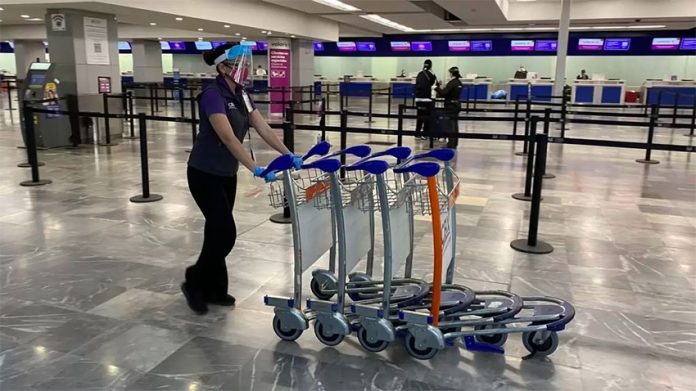Not unexpectedly, traffic took a dive at Mexico City’s Benito Juárez International Airport last month as the coronavirus continued to take a toll.
The number of travelers dropped by 93.7% compared to the same month last year. Passenger numbers dropped to 275,975 from 4.34 million in 2019.
The decrease was slightly more pronounced in May than it had been in April when the number of air travelers fell by 92.8%.
During the first five months of 2020 the airport saw a 44% drop in passengers, with 8.79 million fewer travelers passing through its terminals, the greatest decrease in travel ever recorded at the airport.
While January and February of this year showed a consistent growth rate of 8%, when the coronavirus pandemic hit in March numbers quickly plummeted and would only get worse.
The Benito Juárez airport, which employs some 35,000 people and is the largest in Latin America, saw more than 50 million passengers in 2019, and had been experiencing steady growth for the past eight years.
The airlines are feeling the pain as well. Mexico’s largest national airline, Aeroméxico, saw traffic decline by 91% in April and 92.4% in May. Volaris saw a 90% reduction in passengers during the same period.
Embattled discount airline Interjet has returned nearly 60 of its planes to leasing companies in recent months, is only operating three aircraft in its fleet and is being sued by the city of Chicago for US $2.56 million in unpaid airport fees.
The reduced number of passengers also translates into a marked decrease in airport taxes, which serve as a guarantee for the payment of US $4.2 billion that the government owes to holders of international bonds that financed the canceled airport project in Texcoco.
Earlier this month the government also announced the cancellation of a project to add a third terminal to the Benito Juárez airport.
“Due to the pandemic, the operational needs have changed. The demand of passengers in the air industry, in Mexico and elsewhere, has fallen a great deal, and it will take between two and four years to recover the levels we had in February 2020,” the government said in a statement.
By that time the General Felipe Ángeles International Airport in nearby Santa Lucía is expected to be open.
Peter Cerdá, the vice president for the Americas of the International Air Transport Association (IATA), confirmed that air traffic in Mexico will take at least three years to recover.
Globally, 93% of airline routes have been canceled, and losses to the airline industry this year are estimated to approach US $84 billion with US $16 billion in losses projected for 2021, IATA says.
Source: El Financiero (sp), Prensa Latina (en), Simple Flying (en), Financial Post (en)
